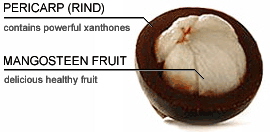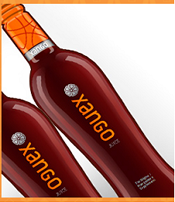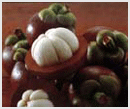-Pub Med Research (opens new page) |
Q. What do the Xanthones in the pericarp of the Mangosteen fruit do?
A There are over 40 known Xanthones in the pericarp of the Mangosteen fruit. There are also polysaccharides and other active chemicals that give the Mangosteen fruit its medicinal properties. The following is a short list outlining some of these benefits:

-
Antiinflammatory – is known to inhibit swelling, tenderness, edema and pain
-
Antioxidant – known to stop the harmful effects of free radicals in the body
-
Cholesterol – inhibits the oxidation of LDL (the bad) cholesterol before it has a chance to damage the lining of an artery an cause a plaque to build up. In other words, reduces the risk of atherosclerosis.
-
Immune system: - posses potent anti-bacterial, anti-viral and anti-fungal properties
-
Antitumor properties – the Xanthones from Mangosteen inhibited growth of different types of liver cell cancer and showed promise with pancreatic cancer
-
Digestive system – demonstrated anti-ulcer activity and helped the body overcome diarrhea and dysentery
-
Antiallergic – demonstrated to reduce the effects of allergic reactions of the body from common allergins to anaphylaxis
-
Central nervous system – the Mangosteen is shown to produce a therapeutic effect in both the treatment and prevention of Parkinson’s and Alzheimer’s disease
-
Skin – demonstrated to reduce the effects of dermatitis, eczema and skin infections
Mangosteen Xanthones Research Articles
Research Mangosteen Ohio State University on Mangosteen
Xanthone Garcinone E with Cancer Cell Lines
Xanthones in Garcinia Mangostana
Research Xanthones Mangostana Xanthones
Garcinia Mangostana by Dr. Templeman MD
Mangosteen Plant Tree and Growing Facts
Mangosteen Antioxidants, Phytochemicals, Coenzyme Co-Q10, Polyphenols, Flavonoids, Bioflavonoids, Anthocyanins, Tannins, Catechins, COX-2 inhibitors, Xanthones
Xanthones Research from Mangosteen Research on Cell Lines
Mangosteen Research Garcinone E Xanthone Derivative
Inhibitions of Histamine Release & Prostaglandin E2 Synthesis Xanthones by Mangosteen
Garcinia Mangosteen Xanthones Research
Xanthones in Mangosteen Pericarp Mangostin & Gamma-Mangostin
Gamma-Mangostin & Alpha-mangostin Xanthone Research Cox-1 Cox-2 Activity from Xanthones
Immuno Pharmacological Activity of Polysaccharide Xanthones from Pericarp
Histaminergic and Serotonergic Receptor blocking Xanthones Research from Mangosteen
Mangosteen Research Garcinia Mangostana Potent Antioxidation Xanthones Research
Antidiarrheal Medicinal Herbs
Garcinia Mangostana Mangosteen Fruit Tree XanGo
Mangosteen Research Garcinia Growing
Mangosteen Fruit "Queen of Fruits"
Q. I consider myself a healthy person. I try to balance my diet and I take a multi-vitamin each morning. Am I getting Xanthones from my food?
A. No. The Xanthone family of phytonutrients are found primarily in two families in nature ... Guttiferae (the family of the Mangosteen) and Gentianaceae. The pericarp of the Mangosteen is a premier source where Xanthones are found in concentrated amounts. Many scientific studies name the Mangosteen pericarp as one of the main sources of Xanthones in nature. There are (so far) over 40 identified Xanthones in the pericarp of the Mangosteen fruit.
Mangosteen Research
The Mangosteen, if scientific research is any indication, is perhaps the most important fruit on earth.
The Mangosteen contains several classes of phytonutrient antioxidants and is the only place in nature to contain a broad spectrum of a new class of phytonutrients called Xanthones. The potent effects on human health of the Mangosteen have been observed for centuries in Southeast Asia, and have been scientifically documented. Here is a summary of the benefits of the Mangosteen:
Mangosteen – What is it?
The Mangosteen is tangerine-sized and is deep purple in color on the outside, with a bright white pulp in the inside. Prized because of its excellent flavor, in Asia it is called the “Queen of Fruits,” and, in the French Caribbean, the Food of the Gods.” Used for centuries throughout the lands in which it grows, recent scientific studies have revealed an incredible scope of potent human health benefits leading many to believe that Mangosteen will be the most important fruit on earth.
Immune System
Protects against pathogens, sepsis, influenza, pneumonia, tuberculosis, AIDS, and diverticulosis. Anti-bacterial, anti-viral, anti-fungal. Laboratory demonstrated to interfere with HIV protease, which keeps the virus immature and incapable of infections. Thai study demonstrated effectiveness against staphylococcus aureus bacteria. Polysaccharides in the rind stimulate phagocytic immune cells (PMN’s and monocytes). Effective against salmonella, typhus and tuberculosis bacteria.
Asian healers have used Mangosteen for centuries for syphilis, malaria, and amebic dysentery. In South America, it is used for intestinal worm infestations.
Anti-Tumor Properties
Catechins in Mangosteen: Prevent formation of carcinogenic compounds by blocking co-carcinogens. Turn up body’s natural detoxification defenses. Suppress cancer promotion or growth.
Gastro-Intestinal System
Dysentery, GI pathogens, diverticulosis, histamine and serotonin blocking capacity. Reduces excess stomach acid. Anti-allergic effect. Anti-stomach ulcer.
Respiratory System
Mangosteen study in September 2002 reported that it is an anti-inflammatory and anti-allergenic agent. Relevant for asthma. Xanthoses modulate IGE, antibody class involved in allergic reactions. Mangosteen can accomplish “what we now use several drugs to do. Ideal product to use daily to protect our respiratory system’s integrity”
The Central Nervous System
Dr. Nakahata’s research with glial cells (central nervous systems cells) suggest that Mangosteen could produce a therapeutic effect in both treatment and prevention of Parkinson’s and Alzheimer’s disease.
Skin
Mangosteen used for centuries to treat eczema, dermatitis, wounds, ringworm, acne, impetigo, and growth disorders of dermis (psoriasis or seborrhea) skin cancer and sun damage.
Folk Medicine Remedies (India, China, Malaysia, Philippines, etc.)
Antimicrobial/anti-inflammatory powers. Treating eczematous and hyperkeratotic skin conditions. In Caribbean, tonic for fatigue and malaise. Controlling fever.
Systemic Effects
Helps with fatigue, low energy. Used on persons with chronic fatigue and illness. From Dr. James Duke, perhaps America’s foremost ethnobotanist. Retired in 1995. He worked for the USDA and University of Maryland. Prolific writer and created a phytochemical and ethnobotanical database. Mangosteen is listed with 138 separate benefits see below.
Third-Party Research Disclaimer
Information and statements regarding dietary supplements have not been evaluated by the Food and Drug Administration and are not intended to diagnose, treat, cure or prevent any disease. Information is provided for informational purposes and is not meant to substitute for the advice provided by your own physician or other medical professional. If you have or suspect that you have a medical problem, promptly contact your health care provider.
The following are the major benefits. Source: click here:
• Anti-fatigue
• Anti-tumor and cancer prevention
• Anti-aging
• Anti-oxidant
• Anti-lipidemic – blood pressure lowering
• Anti-inflammatory – prevents inflammation
• Anti-ulcer – prevents both stomach, mouth, and bowel ulcers
• Anti-obesity – helps with weight loss
• Anti-atherosclerotic – prevents hardening of the arteries
• Anti-viral – prevents or modulates fungal infections
• Anti-depressant
• Anti-Alzheimers – helps prevent dementia
• Anti-arthritic – prevention of arthritis
• Anti-osteoporosis – helps prevent the loss of bone mass
• Anti-periodontic – reduces/prevents inflammation and infection of gums
• Anti-seborrhic – prevents seborrhea (skin disease that causes dandruff)
• Anti-calcultic – prevents kidney stones
• Anti-pyretic – fever lowering
• Anti-Parkinson
• Anti-diarrhea
• Anti-neuralgic – reduces nerve pain (i.e. diabetic neuropathy of the feet, hands)
• Anti-vertigo – prevents dizziness
• Anti-glaucomic – prevents glaucoma
• Anti-cataract – prevents cataracts
• Hypotensive – blood pressure lowering
• Immunostimulant – multiple categories cited
• Cardioprotective – protects the heart
• Analgesic – prevents pain
Disclaimer: This information is for educational purposes only. It is not intended to diagnose, treat, cure or prevent any disease; research is ongoing. Statements contained herein have not been evaluated by the Food & Drug Administration. As in all health situations, qualified professionals should be consulted. |


